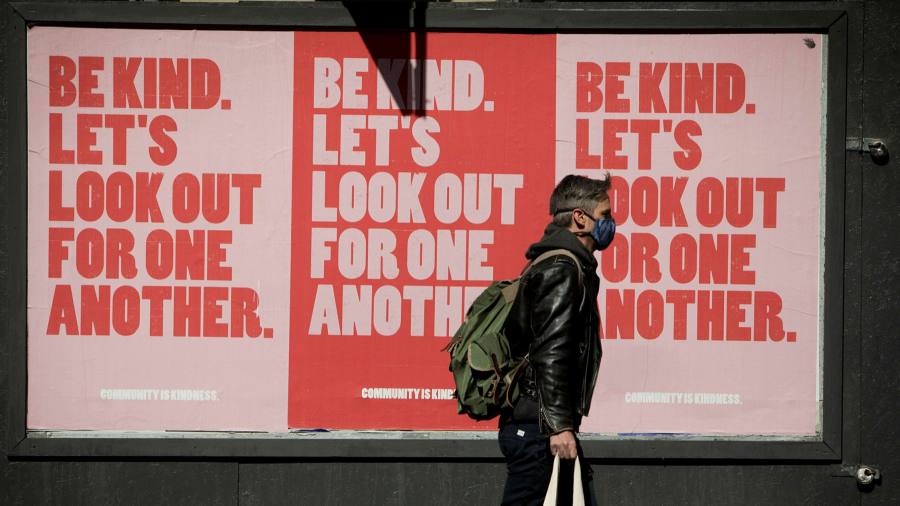[ad_1]
Owen O’Kane grew up well-acquainted with the psychological damage that bombs and bullets inflict on communities long after their immediate impact, having witnessed first-hand the troubles in Northern Ireland.
Now a psychotherapist and author based in London, he is convinced that Covid-19 risks leaving similar long-term distress in its wake. In anticipation, he has given the phenomenon a name: “Post pandemic stress disorder.â€
“A lot of people have been affected by trauma. Whether its PTSD (post-traumatic stress disorder) or PPSD you won’t see the full impact at the time. You only see it a few months later. If we don’t take this seriously we are going to have a very unwell group in the population for years to come,†said O’Kane, who was formerly mental health lead for the NHS in west London.
With Boris Johnson, UK prime minister, setting out England’s gradual and cautious exit from lockdown earlier this week and the rollout of the country’s vaccination programme still going well, there are some causes for optimism.
But O’Kane and his peers worry about the long term toll the pandemic is taking on the nation’s mental health.
By the middle of 2020, one in five people in the UK was suffering from depression, twice the number in 2019, according to the most recent data released by the Office for National Statistics.
The Centre for Mental Health, an independent UK charity, has predicted that this will translate into up to 10m people needing new or additional mental health support as a direct consequence of the pandemic. But that may be a conservative estimate given that these figures predate the latest and deadliest wave of the virus as well as a winter of intensified lockdown.
“Why I am on my soap box at the moment is that I feel all of the energy is still on getting the R (the disease’s rate of reproduction) down when we have this other pandemic brewing,†O’Kane said.
Part of the answer, he and other specialists argued, will be in allocating sufficient resources to deal with rising demands on services. Another part, argues O’Kane, will be clinical.
“A pandemic is invisible. It’s not like bombs dropping,†he said. But cumulatively its effects are no less traumatic. “If you don’t address the underlying trauma [in patients], they will relapse,†he said.
The stress associated with home-schooling children while sustaining work, of indebtedness, loneliness, or of being forced to confront at close quarters relationships that are fatally cracked, alongside the continuous threat of the virus itself, for many people has taken a grim toll.
“When you have 120,000 families who have lost someone, many of whom have not been able to say farewell; hundreds of thousands of doctors and nurses who have struggled . . . why would you not expect there to be a large number of people with psychological problems?†said Alastair Campbell, the writer and former director of communications to Britain’s former prime minister Tony Blair. “It would be very weird if you didn’t.â€
Campbell, who published a book last year on his own experience of severe depression, is frustrated at the lack of preparation for this crisis in the making.
“It’s not just that services are terrible in some parts of the country. It is also that the government is missing a massive opportunity,†he said, arguing that the shock of the pandemic has brought mental wellbeing to the forefront of everybody’s minds except, apparently, those in government. “They still think that if you talk about mental health it makes it worse,†he said.
The government has pledged £500m of extra spending on mental health services this year to address waiting times for specialists, which can stretch to months and more, and to invest in the workforce.
“As part of the long-term plan we have committed an additional £2.3bn a year,†said Nadine Dorries, the minister for health, suicide prevention and patient safety.
Dr Adrian James, president of the Royal College of Psychiatrists, said that it was vital this funding sustained increases in trained psychiatrists, and other specialists while addressing a hangover from years in which mental health has been treated as the poor cousin to its physical relative.
“There is a huge backlog of investment in the mental health estate,†he said, adding: “We need to be on the front foot around mental health in relation to Covid rather than reactive.â€
That means taking into account what’s to come. While Johnson’s plan for lifting lockdown aims to remove all restrictions by the end of June, the end of economic support for workers and businesses will cause fresh anxiety.
“As some of the measures that have protected employment security and finances of those in unemployment come to an end, we are facing a cliff edge,†said Catherine Seymour from the Mental Health Foundation, the think-tank. It is calling for temporary £20 weekly increases in welfare payments to be made permanent in next week’s Budget and for a ban on evictions to be extended.
The Samaritans, often the last resort charity for people in distress, has been making similar pleas, pointing to the proven link between recession and increased suicides,
Jacqui Morrissey, the charity’s assistant director of research, said 1.7m people had called on the Samaritans for emotional support between March and December last year, a period, she said, when many people had been deprived of their usual coping mechanisms.
It was imperative, she said, that the voluntary sector, which provides an essential supporting role to the state when it comes to mental health, remains afloat. “We need to make sure that there is a fully funded mental health renewal plan as we come out of that pandemic and that this is at the top of priorities with government working in collaboration with the sector to deliver it,†she said.
[ad_2]
Source link







